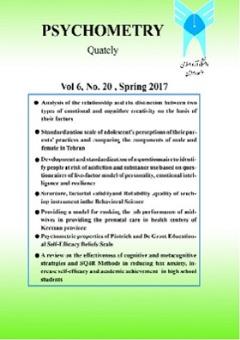Standardization of the Third Versionof the Personality Questionnaire Five Factors (NEO-3)in the Employees of the Prison Organization of the whole country
Subject Areas :jamal shokrzadeh 1 , Kambiz Kamkary 2 *
1 - Islamic Azad University Science and Research Unit
2 - Educational science and psychology Faculty. Associate Professor of Azad University. Islamshahr. Iran
Keywords: ", standardization", , ", version of the third", , ", five-factor personality questionnaire (NEO-3)", , ", employees", , ", prison organization of the whole country", ,
Abstract :
In this research, he addressed "the standardization of the third version of the five-factor personality questionnaire (NEO-3) in the employees of the prison organization of the whole country" and the main question of the research has been determined in this way, whether the third version of the five-factor personality questionnaire (NEO-3) Are psychological characteristics required in the employees of the prison organization of the whole country or not? The current research method is in the field of methodological research with psychometric method. The statistical population of the research is all the employees of the prison organization of the whole country, which is 500 people, who were selected using regular random sampling method. In the present study, the third version of the five-factor personality questionnaire (NEO-3) was used, which has good validity and reliability. Finally, in order to determine the reliability coefficient of the questionnaire with the law on the internal consistency of the questions from the two methods of Cronbach's alpha and dividing the test into two halves, checking the stability coefficient from the test-retest method, to check the criterion validity (of the same type) of the restructure questionnaire form. Minnesota multiphasic Personality Scale-2 (MMPI-2RF) which correlates between two halves and two multi-instruments with Pearson's moment correlation coefficient. Also, in order to check the validity of the construct or factor, the orthogonal hierarchical factor analysis method was used, and the findings showed that the reliability coefficient was higher than 0.87 with an emphasis on internal consistency and stability coefficient. Also, in the validity of construct five, " Neuroticism", " Extraversion", "Openness", "Agreeableness" and "Conscientiousness" are ranked first and the questionnaire has construct validity.

